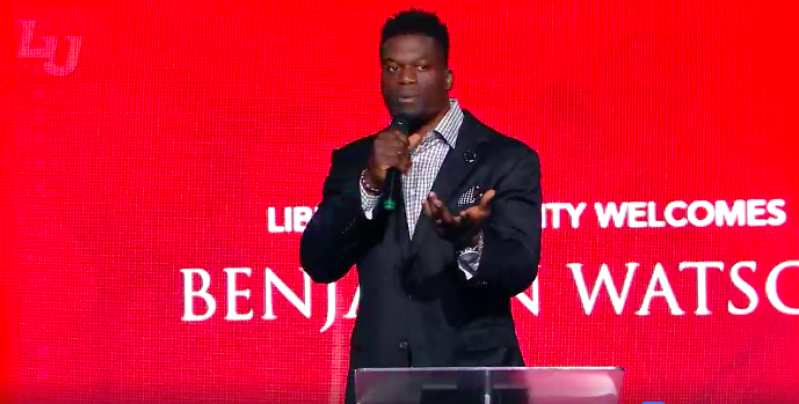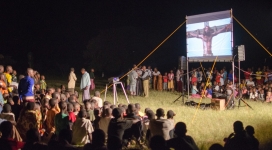
Baltimore Ravens tight end Benjamin Watson recently delivered a powerful message on how the Church can combat racism and prejudice and challenged believers to step outside their comfort zones and have "difficult conversations" to address such issues.
Speaking to Liberty University students last week, Watson, who recently authored "Under Our Skin" to address the racial divide in America, began by emphasizing that the only true solution to racism and prejudice is the blood of Jesus Christ.
"While we're in this world and we live in this world and we must address the ills of this world, we move through this with a biblical perspective," he said. "We understand that there is power in God's name, we understand that that's how hearts are changed. But, we also understand that we have to fight for equality, we understand that there are laws that had to be changed along our path as a country to come to a place where we can all sit together, and we understand there's much more to be done. And because we're believers, because we understand the power of God, we want to work for justice."
Justice comes in all shapes and sizes, Watson said, whether it's advocating for the unborn and victims of sex trafficking, battling income inequality, or fighting racism.
The NFL star pointed to previous events and protests that were spurred by racial inequality, from the fight over Confederate statues in Charlottesville, Virginia to the Black Lives Matter protests in Ferguson, Missouri and Baltimore. He also mentioned the police officers who were "unjustly murdered" by a sniper in 2016 while protecting peaceful protestors.
"Take yourself back," he said. "What kind of emotions do those bring up in you? Because I want you to feel those and understand those. We have to be real with those. If we're going to address this issue, we've got to be real about it."
Still, Watson acknowledged it can be incredibly difficult to create meaningful discussions about racism and prejudice with those who don't know the Lord, particularly in the wake of negative news headlines.
"So many times we...judge other groups by their worst examples," he said. "We put a blanket on them, but whenever someone in our group does it, 'Oh, they're just an exception. We're not all like that.' The Bible speaks strongly about that."
He pointed out that even while many Christians understand the importance of the issue, they're often too shy to bring up the topic.
"For us, this is a gospel issue," he said. "This must be important to us...I'm not going to ask for a show of hands, but I imagine that if I asked, that you all would agree that this racism thing is a pretty big issue. But we still don't really like to talk about it."
He pointed to John 17, where Jesus prays for unity. It reads, in part, "I have given them the glory that you gave me, that they may be one as we are one-I in them and you in me-so that they may be brought to complete unity. Then the world will know that you sent me and have loved them even as you have loved me."
"What is this unity and how to we achieve it?" Watson asked. "One, this unity was given to us by our Savior, and it's nonexistent from Him. We can't have true unity unless it comes from Him."
As we strive for unity, we must invoke the power of God, he asserted.
"We all need a heart change, especially when it comes to this topic," he said. "Laws, education, and exposure are all important to this, but truly, we need our hearts to be changed. And that comes from the power of God."
Unity is not only for us, but for the benefit of the world, Watson said.
"How can we honestly say that we are concerned about those who don't know the Lord, but we sit there when it comes to race, we say the same things about 'the others' that everybody else does who doesn't know the Lord, you go to our churches, and even though they're in cities that are integrated, the churches, eight of ten of them, have one predominant ethnicity."
He added, "We don't want to mingle with each other unless it's cheering for a team. We separate and go in our own corners all the time, yet we tell the world, 'Look at us, as a body of believers, we represent Christ.' They're looking at us like, 'Well, if you represent Christ, I don't want no part of it.'"
As believers, we should be on a mission to bear witness to the Son, Watson said.
How, then, can we foster unity?
The athlete encouraged attendees to get to know those outside of their comfort zones and have difficult conversations about racial inequality. That, he said, is the first step in creating progress towards racial unity.
"Growth doesn't happen when you're comfortable," he said. "We need to have some more uncomfortable conversations. And not just have the uncomfortable conversations, but be willing to follow through with whatever the next step is going to be."
He concluded: "The table is set...I truly believe that this unity issue is a gospel issue, and as believers, it's incumbent upon the Church to be the light. If we're not, who's gonna do it? Be willing to care about something that doesn't directly affect you."
Watson was introduced by Liberty President Jerry Falwell, who said, "We are thrilled to have Benjamin Watson back in the house with us this morning. He has become a national voice for diversity and unity."







